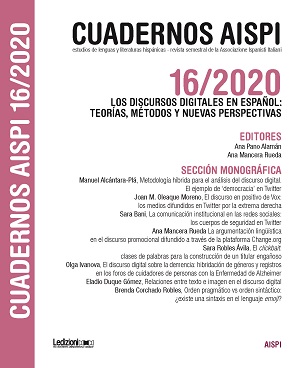A hybrid methodology for the analysis of digital discourse. The case of “democracy” on Twitter
DOI:
https://doi.org/10.14672/2.2020.1696Abstract
The study of the language used on the Internet requires important methodological changes. This article shows the usefulness of integrating quantitative strategies in a traditionally qualitative field: Critical Discourse Analysis. We do it by analysing the term “democracy” as used in the Twitter accounts of the main political parties of Spain. We describe how each party understands this concept taking as a starting point the co-occurrences of this word with other concepts in the corpus.
Downloads
References
Alcántara-Plá, Manuel (2019), “Usos políticos de las redes sociales en campaña electoral”, Mutaciones discursivas en el siglo XXI: la política en los medios y las redes, eds. Nel·lo Pellisser Rossell; Joan M. Oleaque Moreno. Valencia, Tirant Lo Blanch: 17-34.
Alcántara-Plá, Manuel, (2020), “Fuzzy Limits: Researching Discourse in Internet with Corpora”, Second International Handbook of Internet Research, eds. Jeremy Hunsinger; Matthew Allen; Lisbeth Klastrup. Amsterdam, Springer: 1-17.
Alcántara-Plá, Manuel; Ruiz Sánchez, Ana (2018), “Las campañas electorales en las redes sociales. El ejemplo de Twitter en España”, El análisis del discurso político: géneros y metodologías, ed. Carmen Llamas Saiz. Pamplona, EUNSA: 131-54.
Alcántara-Plá, Manuel; Ruiz Sánchez, Ana; Benito Rey, Marisol; Martín Jano, Alejandro (2018), Estrategias de encuadre y articulación del discurso político en 140 caracteres, Proyecto de Excelencia financiado por el Ministerio de Economía y Competitividad (FFI2014-53958-P).
Carreras, Xavier: Chao, Isaac; Padró, Lluís; Padró, Muntsa (2004), “FreeLing: An Open-Source Suite of Language Analyzers”, Proceedings of the 4th International Conference on Language Resources and Evaluation (LREC’04): 239-42.
Chadwick, Andrew (2013), The Hybrid Media System: Politics and Power, Oxford, Oxford University Press.
Coleman, S. (2013), “The Internet and the Opening Up of Political Space”, A Companion to New Media Dynamics, eds. John Hartley; Jean Burgess; Axel Bruns. Hoboken, Wiley Blackwell: 377-84.
Conway, Bethany A.; Kenski, Kate; Wang, Di (2015), “The Rise of Twitter in the Political Campaign: Searching for Intermedia Agenda-Setting Effects in the Presidential Primary”, Journal of Computer-Mediated Communication, 20: 363-80.
Dader, José Luis (2003), “Ciberdemocracia y ciberparlamento. El uso de correo elctrónica entre los parlamentarios españoles y ciudadanos comunes (1999-2001)”, Telos: Cuadernos de Comunicación, Tecnología y Sociedad, 55: 86-96.
Fillmore, Charles J. (1982), “Frame semantics”, Linguistics in the Morning Calm, ed. The Linguistic Society of Korea. Seoul, Hanshin Publishing Co: 111-37.
Gibson, Rachel; Römmele, Andrea (2008), “Political Communication”, Comparative Politics, ed. Daniele Caramani. Oxford, Oxford University Press: 473-89.
Goldberg, Adele E. (1995), Constructions: A construction grammar approach to argument structure, Chicago, University of Chicago Press.
Howarth, David (2005), “Applying Discourse Theory: The Method of Articulation”, Discourse Theory and European Politics: Identities, Policy and Governance, eds. David Howarth; Jacob Torfing. London, Palgrave: 316-49.
Howarth, David; Stavrakakis, Yannis (2000), “Discourse theory and political analysis”, Discourse theory and political analysis: Identities, hegemoniesand social change, eds. David R. Howarth; Yannis Stavrakakis; Aletta J. Norval. Manchester, Manchester University Press: 1-23.
Kilgarriff, Adam (2009), “Simple maths for keywords”, Proceedings of Corpus Linguistics Conference CL2009, eds. Michaela Mahlberg; Victorina González Díaz; Catherine Smith. Liverpool, University of Liverpool: 171.
Laclau, Ernesto; Mouffe, Chantal (1985), Hegemony and socialist strategy: Towards a radical democratic politics, New York, Verso.
Lakoff, George; Johnson, Mark (2008), Metaphors we live by, Chicago, University of Chicago press.
Langacker, Ronald W. (1991), Foundations of Cognitive Grammar. Descriptive Application, Stanford, Stanford University Press.
Mancera Rueda, Ana; Pano Alamán, Ana (2013), “Nuevas dinámicas discursivas en la comunicación política en twitter”, Circulo de Lingüística Aplicada a la Comunicación, 56: 53-80.
Padilla Herrada, María Soledad (2015), “La argumentación política en twitter”, Discurso & Sociedad, 9/4: 419-44.
Partington, Alan; Duguid, Alison; Taylor, Charlotte (2013), Patterns and Meanings in Discourse. Amsterdam, John Benjamins.
Ruiz Sánchez, Ana; Alcántara-Plá, Manuel (2019), “¿Quién es el pueblo? La exclusión de las minorías en la campaña electoral 2015 en España”, Political discourses at the extremes. Expressions of populism in the Romance Speaking Countries, eds. Françoise Sullet-Nylander; María Bernal; Christophe Premat; Malin Roitman. Stockholm, Stockholm University Press, 105-24.
Schiffrin, Deborah (1994), Approaches to Discourse, Oxford, Basil Blackwell.
Tannen, Deborah (1993), Framing in Discourse, Oxford, Oxford University Press.
Wodak, Ruth; Michael Meyer (2016), Methods of Critical Discourse Studies, London, Sage.
Zamora Medina, Rocío; Zurutuza Muñoz, Cristina (2014). “Campaigning on Twitter: Towards the Personal Style Campaign to Activate the Political Engagement During the 2011 Spanish General Elections”, Comunicación y Sociedad, 27/1: 83-106.
Zugasti Ricardo; Sabés, Fernando (2015), “Los issues de los candidatos en Twitter durante la campaña de las elecciones generales de 2011”, Zer, 20/38: 161-78.
Downloads
Published
Issue
Section
License
Copyright (c) 2020 Manuel Alcántara-Plá

This work is licensed under a Creative Commons Attribution-NonCommercial-NoDerivatives 4.0 International License.
La revista está publicada bajo la licencia Creative Commons CC-BY.




